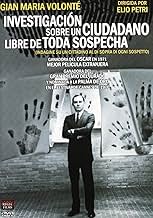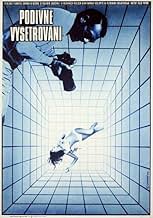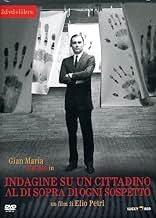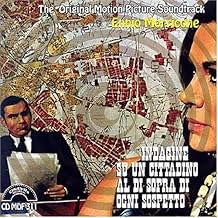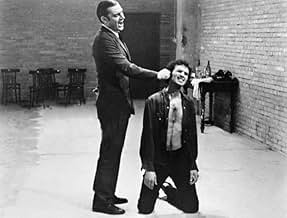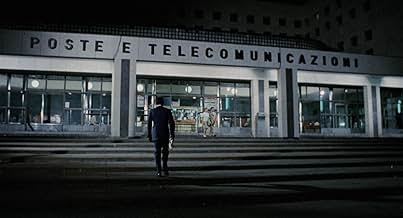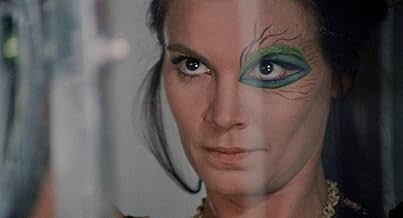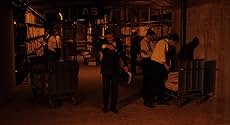VALUTAZIONE IMDb
8,0/10
14.514
LA TUA VALUTAZIONE
Il capo della sezione omicidi uccide la sua amante e lascia deliberatamente indizi per provare la propria colpevolezza.Il capo della sezione omicidi uccide la sua amante e lascia deliberatamente indizi per provare la propria colpevolezza.Il capo della sezione omicidi uccide la sua amante e lascia deliberatamente indizi per provare la propria colpevolezza.
- Regia
- Sceneggiatura
- Star
- Vincitore di 1 Oscar
- 16 vittorie e 6 candidature totali
Recensioni in evidenza
Apart from the film's own intriguing theme and interesting credentials, I had always been keen on catching this one because it had defeated Luis Bunuel's magnificent TRISTANA (1970) for the title of the Best Foreign-Language Film at the Oscars! However, the path that ultimately led me to it was quite thorny: I first caught the start of it during a rare Italian TV prime-time screening in the mid-1980s; then, after dropping off the radar for decades, it turned up again on late-night Italian TV but the reception was terrible so I could not tape it; later still, having finally acquired it on my PC, the hard disk went bust before I had a chance to make myself a copy
so that, I had to get hold of it (via the same channels) all over again when the PC was back on its feet!! Even so, a whole year passed before I actually sat down to watch it (on the heels of two other Elio Petri-Gian Maria Volonte' films). INVESTIGATION OF A CITIZEN ABOVE SUSPICION won a clutch of other international awards, so it is not all that surprising to see it emerge triumphant at the Oscars as well and, after seeing it for myself, I cannot say I was displeased by that fact. In short, the film is a veritable masterpiece: brilliantly-made and utterly fascinating, albeit making for typically demanding viewing (particularly during its latter stages). As can be gleaned from the title, the plot revolves around a crime (actually, the murder of his mistress) committed by a highly-respected public official: ironically, the culprit is none other than the exiting Chief of the Homicide Squad (Gian Maria Volonte' who is on fire throughout as the megalomaniac protagonist) on his way out to becoming the Head of Political Intelligence and which, of course, he has the duty to investigate himself! This he does with complete confidence and not a little trickery (destroying and/or planting evidence, deviating the path of the investigation but at the same time admitting to his new superior of having known the victim, etc). His unusual relationship with the latter (sensuously played by Florinda Bolkan), then, is seen via intermittent flashbacks: she is a libertine (much is made of the fact that she possesses no underwear!), initially getting in touch with Volonte' almost in jest and, eventually, playing the willing murdered party(!) in re-enactments of crimes of passion solved by him throughout his illustrious career (of which he, unashamedly, also keeps photographic records). Other important figures to feature in the narrative are: Arturo Dominici (from Mario Bava's BLACK Sunday [1960]) as Volonte''s long-suffering successor; a young student radical who lives in the same apartment block as Bolkan and of whom Volonte' was jealous; and Salvo Randone (like the star, a Petri regular) as a confused old man to whom the pompous anti-hero actually confesses his guilt in the matter and bullies into turning him over to the Police
but the latter, naturally, is shocked to see him lording it at the Homicide bureau! For all the social and political relevance of Petri and frequent collaborator Ugo Pirro's Oscar-nominated script culminating in a delicious double ending (Volonte''s quasi-surreal exoneration by his colleagues, after he professes to have committed the ultimate sacrifice for the good of Established Law & Order, is revealed to have been mere wish-fulfillment on his part
with the true development of the facts cleverly left to the audience members' own judgment) the element which has perhaps been mainly responsible for securing the film its longevity is Ennio Morricone's celebrated bizarre (i.e. half-urgent, half-playful) score which definitely ranks among his finest works, and that's saying a lot!
A chief of detectives (Gian Maria Volontè), homicide section, kills his mistress (Florinda Bolkan) and deliberately leaves clues to prove his own responsibility for the crime.
I absolutely loved this film. It is part crime thriller, part detective story, and a bit of political corruption. Being Italian and having an Italian sensibility, it reminded me more than a little bit of the giallo film genre. But yet, it was distinct. The giallo is in some ways the precursor to the slasher, and this was not that sort of film -- not gory and the killer is not a masked and gloved man.
What really stands out is the score from Ennio Morricone. He has made many scores over the years and without exception they have been quite good. Is he the best composer of the 20th century? Maybe. And I would daresay this is among his very best, easily in the top three. The score alone makes the film worth watching.
I absolutely loved this film. It is part crime thriller, part detective story, and a bit of political corruption. Being Italian and having an Italian sensibility, it reminded me more than a little bit of the giallo film genre. But yet, it was distinct. The giallo is in some ways the precursor to the slasher, and this was not that sort of film -- not gory and the killer is not a masked and gloved man.
What really stands out is the score from Ennio Morricone. He has made many scores over the years and without exception they have been quite good. Is he the best composer of the 20th century? Maybe. And I would daresay this is among his very best, easily in the top three. The score alone makes the film worth watching.
Some comments in light of previous descriptions of the movie.
This movie is definitively about state violence. Even if to a viewer that has no foreknowledge of the police state that was instituted in Italy (with the help of the CIA as the movie alludes to) in order to keep the Communist Party from taking power (the PCI had the biggest following of any parties at that time), the fact remains that the movie is not much more surreal than the socio-political reality facing the film-maker.
Murders and "suicides" (while in police custody) of left-wing political activists and of anarchists are a fact that Elio Petri was painfully aware of. He made a documentary called "Streghi dello stato" "witches of the state" where Jean Maria Volonte and others expose such "suicides". Elio Petri was politically aware and through out his work there is criticism of the right wing of Italian politics (see TODO MORO).
I think that the movie is most powerful once you are aware of the fact that you can be victimized at the hands of an institution, esp. at the hands of an institution that exists only to maintain political order. Once the politicization of the priorities of those institutions that have the legitimate use of violence occurs, than meaningless violence towards the innocent will be allowed if punishing it would impair the political functions of the state machinery. Flora Balkan is perhaps a symbol for the masses, their love of violence and power, their love for the undoing of their freedoms.
A very fine movie that requires some effort, but that is always actual - thanks to an interesting narration of human nature. The movie does have it's flaws and i the action is not as invigorated as one expects it to be after the first 15 minutes, neither is the camera work at the level it has to be for this movie to be the greatest ever but it is still a hell of a great movie.
Whether or not you agree with this movie's negative portrayal of state violence and of that primal attraction that violence has (explored in a marvelously Mediterranean style in this movie) for so many could make the difference in how much you are puzzled by the movie. If you see it a a satire of power and violence - it might work.
This movie is definitively about state violence. Even if to a viewer that has no foreknowledge of the police state that was instituted in Italy (with the help of the CIA as the movie alludes to) in order to keep the Communist Party from taking power (the PCI had the biggest following of any parties at that time), the fact remains that the movie is not much more surreal than the socio-political reality facing the film-maker.
Murders and "suicides" (while in police custody) of left-wing political activists and of anarchists are a fact that Elio Petri was painfully aware of. He made a documentary called "Streghi dello stato" "witches of the state" where Jean Maria Volonte and others expose such "suicides". Elio Petri was politically aware and through out his work there is criticism of the right wing of Italian politics (see TODO MORO).
I think that the movie is most powerful once you are aware of the fact that you can be victimized at the hands of an institution, esp. at the hands of an institution that exists only to maintain political order. Once the politicization of the priorities of those institutions that have the legitimate use of violence occurs, than meaningless violence towards the innocent will be allowed if punishing it would impair the political functions of the state machinery. Flora Balkan is perhaps a symbol for the masses, their love of violence and power, their love for the undoing of their freedoms.
A very fine movie that requires some effort, but that is always actual - thanks to an interesting narration of human nature. The movie does have it's flaws and i the action is not as invigorated as one expects it to be after the first 15 minutes, neither is the camera work at the level it has to be for this movie to be the greatest ever but it is still a hell of a great movie.
Whether or not you agree with this movie's negative portrayal of state violence and of that primal attraction that violence has (explored in a marvelously Mediterranean style in this movie) for so many could make the difference in how much you are puzzled by the movie. If you see it a a satire of power and violence - it might work.
Saw this film in New York at a revival. The tale of power and of right-wing/fascist politics corrupting is shockingly timely even today, in this time of global conflict, with enemies branded "unpatriotic."
The movie portrays the moral corruption of Italian police and politics in the 1970's, with totalitarian tactics wrapped in patriotism. The movie's lead policeman is swept up in the power of position. Sadly, it's only too easy for me to believe his ability to use his position and power to manipulate people and place himself above "the law".
The movie "looks" Italian and 1970's, with stark concrete and flat colors, which appealed to me. The story builds well, jumping backwards to fill in details, to climax in an alternate possible ending, very believable. I highly recommend it.
The movie portrays the moral corruption of Italian police and politics in the 1970's, with totalitarian tactics wrapped in patriotism. The movie's lead policeman is swept up in the power of position. Sadly, it's only too easy for me to believe his ability to use his position and power to manipulate people and place himself above "the law".
The movie "looks" Italian and 1970's, with stark concrete and flat colors, which appealed to me. The story builds well, jumping backwards to fill in details, to climax in an alternate possible ending, very believable. I highly recommend it.
If the crime, corruption , comes from who is expected to judge or to combat the crime ( judges , policemen)the chances that you will not pay for it is infinitely lesser than if are not part of the system.
Lo sapevi?
- QuizFirst part of the "Trilogy of Neurosis", also including La classe operaia va in paradiso (1971) and La proprietà non è più un furto (1973).
- Citazioni
Il Dottore - Former head of homicide squad: The people are underage, the city is sick. Others are tasked with educating and curing this. Our duty is to repress it! The repression is our vaccine! Repression and civilization!
- Versioni alternativeThe subtitled American version distributed by Columbia has slight differences in the credits. The Italian version opens with blank white-on-black credits (as many other Petri films do). The American version projects the credits onto the opening scene with the Dottore walking around the street. Both the opening and the closing credits (including the film's title and the Kafka quotation) are translated to English as well.
- ConnessioniEdited into Colpiti al cuore (2019)
I più visti
Accedi per valutare e creare un elenco di titoli salvati per ottenere consigli personalizzati
- How long is Investigation of a Citizen Above Suspicion?Powered by Alexa
Dettagli
- Data di uscita
- Paese di origine
- Lingua
- Celebre anche come
- Investigation of a Citizen Above Suspicion
- Luoghi delle riprese
- Azienda produttrice
- Vedi altri crediti dell’azienda su IMDbPro
Botteghino
- Lordo Stati Uniti e Canada
- 265.470 USD
- Tempo di esecuzione
- 1h 55min(115 min)
- Mix di suoni
- Proporzioni
- 1.85 : 1
Contribuisci a questa pagina
Suggerisci una modifica o aggiungi i contenuti mancanti



